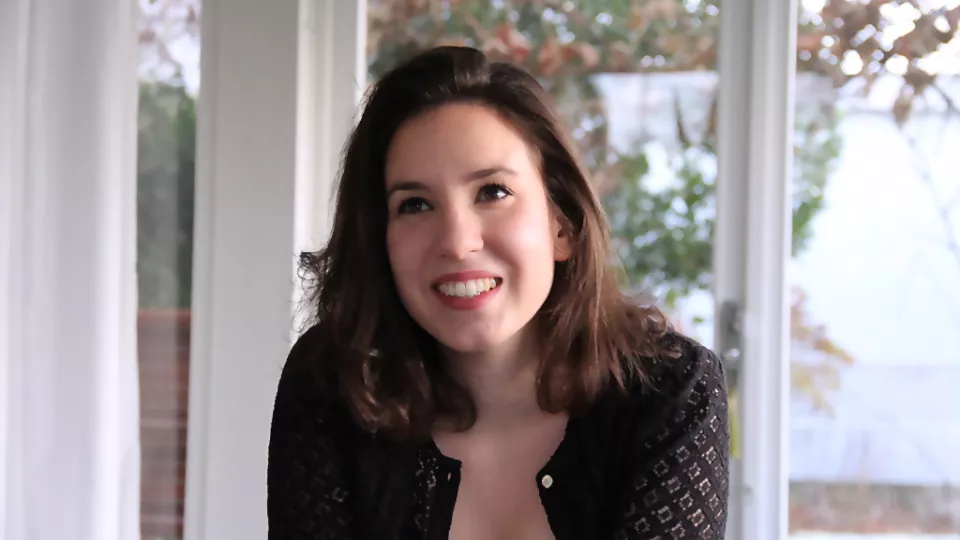Stella is from Germany and has since before a bachelor’s degree in European Studies, which she describes as a mix of political and cultural studies.
- I always thought I would end up in a clearly political field, I was even interested in working at the EU in Brussels one day.
However, as time went by she realised she wanted to learn something else and applied for several master’s programs around Europe. But Strategic Communication at Lund University was always her favorite, and that's where she ended up.
Your thesis is called “Startup Branding in Practice – Unpacking the Black Box of Corporate Branding”. How did you come up with this specific project?
- In spring 2017, I started to write articles for oresundstartups.com, a news website about startup-happenings in the Öresund region, since I wanted to learn more about young ventures and also intended to get in contact with entrepreneurs in general. Then, during the summer, I did an internship in a brand consultancy, intensifying my interest in branding and brand management which was originally initiated by a course in the master program about that. Reading academic literature about startup branding I got the impression it just imposes corporate branding, which is for way bigger companies, on startups. It seems to be neglected to a great extent that a startup simply does not has the internal structures and size a corporation has and thus branding probably has to work differently because you then have to consider different factors and actors that are important. Thus I decided to make a study out of it, by looking at how corporate branding in theory works and also how branding startups in real life actually happens.
How was the work carried out?
- I contacted a number of startups in the Öresund region and ended up with three, in three different stages of their growth, that agreed to participate. I did observations at their offices, interviewed them and also looked at their internet presence such as social media in order to find out how each startup “creates” itself as a brand – or not. At the same time, I looked how academic literature suggests that branding works, in particular the concepts of brand identity and brand building. For analysing both sides, practice and theory, I used Actor-Network-Theory, which is a concept and method that suggests that the world is built of networks with a great number of actors that take on roles within these networks. In terms of my three startups as case studies, this allowed me to trace and illustrate what actors or factors influence the branding process in a startup, such as investors, which do not play a role in corporate branding, since bigger companies are in most cases not financially depended anymore.
Has the work with your thesis been straightforward or did you hit any obstacles or problems during the process?
- There were several challenges along the way to the final hand-in of my master thesis. For example, in the very beginning, I had a hard time to find startups that were willing to help me and also find three different ones in different stages of growth within one industry. Moreover, in general, I would say, one is never “done” with a master thesis, you always have to adapt parts to each other over and over again to make the whole text coherent and that is definitely one of the biggest challenges because that takes a lot of time – and nerves.
How do you think your thesis can be useful even outside the walls of the university?
- I hope my thesis helps to get startups thinking about branding early. I got the impression they often don’t really see the necessity of it since they are very focused on the financials, in order to survive. However, I think building startups as a brand right from the beginning is beneficial for the financial side too, since, for example a strong employer branding even if you are a team of only six people, creates awareness among customers for the company and builds a strong internal culture which will help to grow as a company in the long run.
What is your plan now after graduation?
- I am back in Germany and will relax and travel over the summer. From September on I will start working full-time as a consultant.
Finally, do you have any advice to future students, what to think about when planning and writing their thesises.
- In my opinion, finding a topic for the master thesis is a lot of trial-and-error, because you have to identify a real problem and then narrow it down so it fits within the framework of a master thesis. So I definitely recommend to start thinking quite early about a topic, maybe even already in the summer before, by reading literature on what you are interested in, reflecting on what you have learned in your courses so far and if you think there was something that didn’t make sense or wasn’t clear to you in the courses that you can turn into a research problem. If you start with all that in January, when the semester for writing the master thesis starts, you are basically already under time pressure and do not have the calmness to find a rich and fitting topic.
Interview by Ola Elleström


